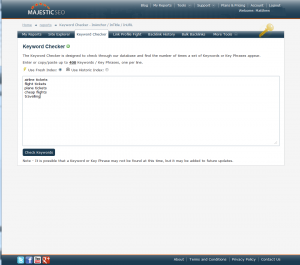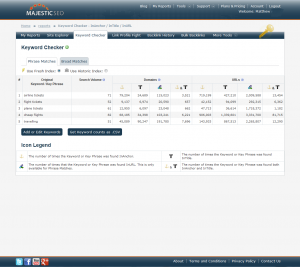Google has recently updated A new Algorithm to dig over out horrific websites from the good quality and many website owners now find that their websites have totally vanished from the search results. The first major update to Google’s algorithm was the Panda update. It was intended to find and remove websites that were perceptibly using spamming tactics to rank high in search results. Now the
Penguin update has wreaked disaster for many websites.
Penguin hit EMD (Exact Matching Domain)
This time EMD’s [Exact Match Domain] has got hit i.e. most of the domain containing exact keywords have got penalty. Most probable reason of penalty is link building structures these websites are using. Since this website contains main keyword with their domain name, hence link building is done with same anchor text.
In 2012 Google has got many algo updates for search engines.
We have seen over optimization or web spam algorithm update later which was named as Penguin. (Later on its update came with name Penguin 1.1).Just before it we have seen various Panda update like Panda update 3.2, Panda update 3.3, Panda update 3.4, Panda update 3.5 & Panda update 3.6)
Private Blog Networks got banned.
Many Low quality Article sites were banned.
Many websites with exact match anchor text got penalized.
We have got Knowledge graph.
Google Places pages were replaced by Google+ Local Pages.
Basic of Google Penguin Algorithm
Penguin is an algorithm (just like Google Panda) introduced by Google to fight spammy websites for better SERPs (Search Engine Result Pages) and user experience. This algorithm basically fight against spammy activities like Keyword stuffing, Cloaking and link SPAM. And, encourages webmasters to follow the
Google’s quality guidelines .
Google will continue to update the Penguin algorithm version, every few months, to continue the fight against SPAM.
How to Know – You are Hit by Penguin
The simplest yet proven method is – Open your Google Analytics and “ monitor your organic visitors from Google ”.
If the number of visitors dropped at least 33% just after an update, then you are most probably hit by the Penguin. You should also consider about Google Dance, before the final decision.
In precision, there are many websites that should have been removed. The websites that were hardest hit are the ones that use spam and other technique to try to get a better search position. Not all sites exaggerated by Penguin engaged in spam. In fact, one of the main reasons to get hit by Google is using bad linking practices. So how can people recover from the latest Google shakeup? Let’s look at some strategies for recovery.
Most websites are not so much guilty of spamming their links to thousands of websites, as they are of indulging in bad linking practices. If you have used link networks, used sponsored WordPress themes, or reciprocal linking that is of poor quality, your website may have been hit by the Penguin update. According to Google’s Matt Cutts, “It is possible to clean things up.” If your site has been hit by Penguin (you will know this because your traffic has dropped since the April 24 Penguin update), there are quite a few things you can do to bring your website back up in the search results.
Tips For Recover A Site From Google Penguin Update
1. Remove any on-page spam on your website. Examples of on-page spam include due to excess of keywords, such as buy or used cars, in order to rank better in search results. Poor quality and spun content that is stuffed with keywords, but offers the visitor no value otherwise, should be removed and replaced with high quality content that is relevant to the website.
2. If you know that you have bad links, clean them up as best you can. Simply enter your website URL into Google search and see what kind of links come up. Examples of links that can be removed include forum profile links. This is, of course, only possible if you have the login information so you can erase the links in the profiles.
3. There is supposed to be a further Penguin update. Website owners are advised to wait until the next update to see if their website recovers. In the meantime, stop all excessive linking practices. It may be a good idea to opt out of link networks for the time being, since these are being hit especially hard.
4. There is also news that some WordPress plugins are inserting hidden links. This may have caused a penalty. Try removing WordPress plugins to see if this makes a difference. If your website does not recover after a few months, it may be necessary to start completely from scratch with a new website. Sometimes it is best to cut your losses and start again.
5. If you feel you are innocent of spamming but have been hit anyway, there is a form that can be filled out on the Google website that allows you to explain your case.
8 Best Recovery Tips
1. Keyword stuffing: Make a site-wide audit for keyword stuffing. Check for high ranking pages, who have suffered more on SERPs.
How to do: Check for the total number of words on a particular post or page from your Admin Panel. Then, check the number of times a particular keyword repeated on that page by using the simple ‘ find ’ feature in your browser (Edit –> Find or Ctl + F). If the keyword density is more than 2%, simply restructure the article or page with the gist intact. You may consider to update the article with latest info also.
2. Cloaking: If you are practicing any Cloaking or Doorway pages, then stop it immediately.
3. Paid links: If you have purchased any type of backlinks, either from a link farm or from an individual, contact by an Email or telephone and make a request to remove the links as soon as possible.
4. Spammy outbound links: Also known as ‘ Bad Neighborhood ’. If you have given links to any spammy websites, withdraw it immediately.
Check the overall health of the site, to whom you have given the backlinks using 2 simple methods.
(a) Is the site hit by Penguin? (Compete Traffic Stats ) Not so reliable, as Compete updates site status very infrequently and show stats of only US traffic. Still you can use it for assessment.
(b) Search the site for any penalty by Google. Simply type site: Domain name in the Google search. If no links found or only HOME page is found, then the site is definitely penalized by Google for not following the Google Webmaster Guidelines.
If you think, the site is authoritative and not hit by Penguin, you shouldn’t remove the backlink.
5.
Spammy inbound links (-Ve SEO): Check your site-wide backlinks status. Sometimes spammy sites deliberately links good sites with ill intention or with a request from competitor site (paid). This is called -Ve SEO.
But, sometimes your good backlinks turn bad/spammy, because the sites giving links practice black or grey hat seo in the course of time.
Both types of links are unpaid. And, due to the unpaid nature, you have either limited or no control over it/webmasters. You can send Email requests with legal consequences to the concerned webmasters. But don’t expect a quick response or quick result.
Google never penalizes sites for Unpaid-Backlinks with -Ve SEO. In fact, Google excludes the
link juice, if any, from spammy unpaid-links during Penguin updates.
So, you shouldn’t worry much about your spammy unpaid-links.
6. Avoid exact anchor text backlinks: Although you have acquired few good exact anchor text backlinks by guest blogging or paid editorials, Google thinks this is grey hat seo under Penguin updates. Instead of exact anchor text, you should go for long tail or descriptive anchor texts.
7. Avoid directory submission with sole purpose of SEO gain: Google likes paid directory submission, like Yahoo Blog Directory . Because this is paid listing without any guarantee of inclusion of you site, Google thinks it’s transparent and not for the sole purpose of SEO gain/link juice gain.
You may consider listing your blog on few select blog directories like Technorati for wider exposure only.
8. Unlearn SEO: It’s high time to unlearn SEO a bit to be immuned from Penguin algorithm updates. This is appropriate to newbie bloggers and SEO practitioners who are a bit aggressive while practicing SEO.
Good contents make a great blog, and great blogs make a beautiful web. So, lets make our world-wide-web more beautiful by creating great contents for web-surfers/visitors.
Now the article is open for questions about Google Penguin Updates and various Recovery Tips.



















